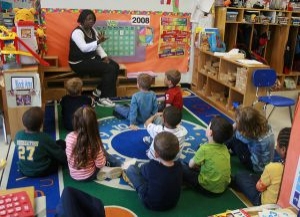Sibling Rivalry is a fairly common part of childhood which usually takes place in the first five years of life. Resentment and jealousy often arises when your first born child is “knocked off their perch”, by the arrival of a new sibling. Your first born child had you all to themselves and being the centre of attention, now your child will feel that the new baby takes up most of your time and attention.
Your child may be showing signs of jealousy towards a sibling in a variety of ways. For instance, your child may become moody when the new baby arrives home or your child may constantly complain about having to share their toys with the baby. A toddler will express their jealousy towards a sibling by hitting them rather than complaining to you.
Typically it's the first born child who may show signs of jealousy but it isn't just the first born child who may be feeling this way. A second or even a third born child may have jealousy towards a new baby even though they are used to living with siblings already in the family. Younger children can also have jealousy towards older siblings because they want you all to themselves.
Signs of Sibling Rivalry
Every child can feel jealousy towards a sibling even if it's out of character. At some point siblings will have negative feelings about their brothers and sisters. It is a part of a growing family.
Below are a few common signs of Sibling Rivalry that one of your children may be showing:
- Fist fights are more likely than verbal disagreements when one of your children is around 2 or 3 years old. A toddler is more likely to be physical aggressive towards a sibling.
- Sibling rivalry tends to be strongest when the youngest child is around 3 or 4 years of age. This will most likely involve you having to deal with frequent fights between siblings.
- Siblings at around 4 to 5 years old begin arguing with one another. This is usually about the same item that they want to play with at the same time. At that stage they haven't developed the ability to share.
- Each child is different. One of your children may let their sibling do whatever they want, however your other child may be ready to fight or complain each time a sibling does something they don't like.
Ages and Stages of Sibling Rivalry
It is suggested that the age gap between siblings does affect their relationship. Most problems of sibling rivalry do occur when the age gap of siblings is between 2 and 4 years apart. A part of a toddler’s development likes to be independent, stubborn and be the center of attention. It is understandable that when a new baby comes along that a toddler will begin to feel upset now that the baby will be the focus of attention too.
Below is a list that will give you an overview of the common stages of sibling rivalry based on the age gap between your children:
Less than 2 years:
- As your first child is still quite young when your second baby is born, they are less likely to feel jealousy towards their sibling.
- It is likely that your children will grow up to become good friends, especially during school age.
2 – 4 years:
- Your first born child will have a better understanding of what is happening and more likely to feel upset at the new baby.
- During feeding of your new baby, your first born may feel jealous as they watch the close physical contact.
- More likely to feel as a “big brother” or a “big sister” as they have their own friends and daily schedule is different from the baby's.
4 or more years:
- You will have a lot more time to spend with your baby since your older child is at school all day.
- Your older child can continue activities, despite the demands of the new baby.
- Arrangements can be made to get a lift from another parent, for instance.
- Your older child will be proud of the new baby and will begin to show off their little brother or sister.
Dealing With Sibling Rivalry When It Occurs
When Sibling Rivalry does occur in your family, it's important to deal with it in an appropriate and fair way for all those involved. Below are a few strategies to use, when dealing with sibling rivalry:
- Encourage alternatives to fighting – Children will begin to handle their disagreements between siblings on their own when they learn how to do so. As a parent you should teach your children alternatives to fighting and arguing. For example, walking away, negotiating and compromising.
- Encourage discussion – It's important to encourage children to talk about how they feel and to express feelings in positive ways. If your child does not want to talk about their feelings, you should accept that as their right. Just make sure that your children know that they can come to you if and when they decide to talk.
- Set specific getting-along rules – Children have a better understand when they know exactly what is expected of them. When you tell your siblings to "just get along," they need to know exactly what that means. For example, no shouting at each other, no teasing, no hurting each other etc. It's a good idea to discuss the rules with your children and encourage them to come up with a set a rules together that they all agree on. This way the children will all have a clear understanding of what is expected of them. You could also write these rules up and display them on the fridge etc.
- Breaking the rules – When establishing getting along rules it's also important to discuss what happens with children if they decide to break the rules. For example, if Sarah hits her younger sister she will have to sit in time out for several minutes. Setting specific and clear “penalties” for breaking rules will avoid any arguments between children about who started what. For example, if siblings begin shouting at one another, a penalty for breaking a rule could be sitting by on their own not talking to each other for several minutes. The penalties should be easy to understand and be agreed on by all siblings.
- Avoid situations that contribute to sibling rivalry – If there are specific situations or activities that enable sibling rivalry behaviour, such as a particular game or a particular toy, you should try to limit it by redirecting your child's attention to something they will gain a better interest in. For example, if your son and daughter play soccer on different teams which brings out competitiveness and arguing about which team is better and who has the most points, you could encourage siblings to play on the same team.
When dealing with sibling rivalry, please try and keep the above points in mind and it's important to remember that it's better not to get involved (unless it's necessary) and try and encourage siblings to settle arguments and disputes on their own.
How to Manage Sibling Rivalry
In most families, sibling rivalry does occur. It's important that as parents, you should try to prevent it from occurring in the first place.
Below are a few practical strategies to help manage sibling rivalry:
- Buy games that siblings can play together – This will enable them to begin to co-operate and play with each other which will begin to ease any tension.
- Take complaints seriously – Listen to your children when they start to complain about one another, which can be tedious and boring at times! Even though for your child these complaints are serious and they need you to advise them on what to do.
- Go on family outings together - By spending quality time with both children. This can be great fun and helps build on sibling relationships.
- Encourage separate group of friends – This ensures that you don't insist your older child taking their younger sibling with them, while visiting friends. If not this can become a problem which may enhance sibling rivalry.
- Acknowledge and accept each of your children as individuals – Your children will certainly have a lot in common with one another and share interests together but acknowledge their individual opinions and ideas. This will help reduce competitiveness between them.
- Settling differences – Try to let siblings settle their own differences. By encouraging them to discuss the issue that they are dealing with, helps siblings to communicate and co-operate by settling their differences between each other.
- Praise getting-along behaviours – Praise can be an excellent motivator to encourage good behaviour. When you see siblings get along, you should let them know. You should be specific when praising good behaviour so the children know what they are doing right. For example, “It's great to see you two sharing that game”. Be careful not to use praise as a way of comparing children. For example, “Good, Johnny you are so much better at that game than your brother”. This will quickly backfire.
- Provide lots of love and affection for your children – You should show both of your children that you love them, through words and actions.
Implementing these simple strategies in your family will help you to ensure that sibling rivalries are easily manageable.
What Not To Do
Most sibling rivalry occurs due to some common mistakes that parents often make. For example, “Johnny, don't worry. you are a better singer than your older brother. You will definitely get the part”. Though as a parent your intentions are good to try and encourage one sibling, the other sibling will not perceive it that way. They will acknowledge the comparison you are making between the siblings and how you’re only providing encouragement to one child not both. This is when sibling rivalry occurs.
Below is a list of what not to do, when dealing with sibling rivalry:
- Don't compare siblings to one another – It's important to try and avoid comparing siblings with each other. If you begin comparing one child to another, this will certainly result in sibling rivalry. Comparisons may cause feelings of hurt and hopelessness if sibling feels they can't or doesn't measure up.
- Don't take sides – You should remain neutral in sibling fights. It's common for siblings to try to involve parents in arguments as a way to gain control over the situation. Also knowing which parent to run too. For example, Tim being mummy's little favorite. Try to stay out of fights between siblings who can stick up for themselves. The only exception is for physical fights. You should step in when fights become physical. It's important to make sure siblings know that they are not allowed to hurt each other. A good way to stay neutral is to simply demand a stop to all the arguments and fighting and refuse to listen to the arguing anymore.
- Don't overreact to sibling arguments – Arguments are definitely going to happen and children learn how to handle arguments by watching you (the parent). If you begin to overreact this may contribute to sibling rivalry.
Sibling rivalry doesn't impact a sibling for the rest of their life. It is very common for siblings to have fights and disagreements (some worse than others) but in siblings end up realizing how important their brother or sister is in their life and couldn't be without them!







 Working as a childcare professional can be a challenge especially when dealing with behavioural problems which may arise. The techniques we use when dealing with
Working as a childcare professional can be a challenge especially when dealing with behavioural problems which may arise. The techniques we use when dealing with There are different types of behaviour that children can display and sometimes it can be hard to manage, especially if a child is having behavioural
There are different types of behaviour that children can display and sometimes it can be hard to manage, especially if a child is having behavioural As a parent, your behavioural expectations of your child can be higher than what is actually developmentally appropriate for your child's age.
As a parent, your behavioural expectations of your child can be higher than what is actually developmentally appropriate for your child's age.
 As Educators, there will be many instances where you will need to write about a child's behaviour. For a behaviour management plan, assessments, half-yearly or
As Educators, there will be many instances where you will need to write about a child's behaviour. For a behaviour management plan, assessments, half-yearly or As Educators when communicating with Parents (through verbal or non-verbal communication), there will be times where we need to discuss issues or concerns that may
As Educators when communicating with Parents (through verbal or non-verbal communication), there will be times where we need to discuss issues or concerns that may Challenging Behaviour is when a child does something that hurts themselves and/or other people.
Challenging Behaviour is when a child does something that hurts themselves and/or other people.
 As part of your child's development it is normal for your child to have anxiety and fears. A baby commonly shows a fearful sign to
As part of your child's development it is normal for your child to have anxiety and fears. A baby commonly shows a fearful sign to It's always difficult to bring up behavioural issues with parents, it can be nerve wrecking to tell a parent that their child misbehaves but that
It's always difficult to bring up behavioural issues with parents, it can be nerve wrecking to tell a parent that their child misbehaves but that All children deal with anger on a daily basis. Thinking about it as a child, there is a lot to be angry about. Elder people
All children deal with anger on a daily basis. Thinking about it as a child, there is a lot to be angry about. Elder people It is important to understand that your child behaviour problems could not just be from attention seeking. There are many factors to take into consideration
It is important to understand that your child behaviour problems could not just be from attention seeking. There are many factors to take into consideration


